By Cristina Cabrera Jarro -
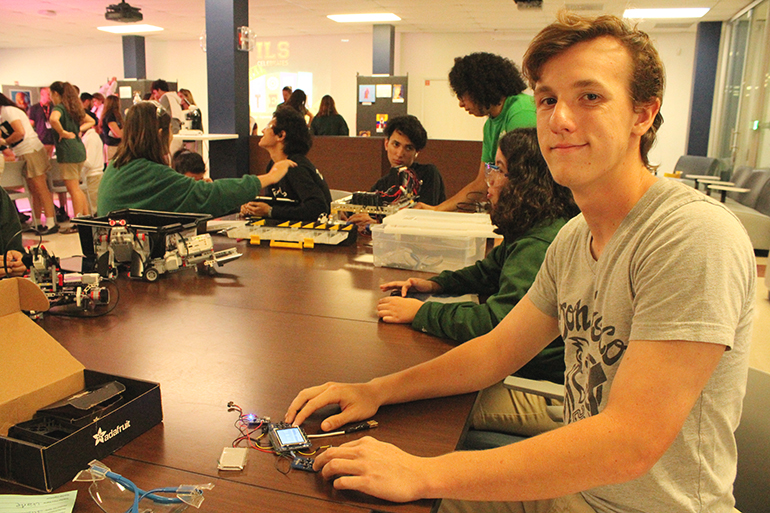
Photographer: CRISTINA CABRERA JARRO| FC
Immaculata-La Salle High junior Nicholas Blanco, an engineering and robotics focus student, tweaks a Gameboy handheld video game console that he built and brought to exhibit at the STEAM Day celebration at the school in November.
MIAMI | When learning anything, an “A-ha!” moment is key.
At Immaculata-La Salle High School, opportunities for “A-ha!” moments — and its counterparts, “Oh” and “I get it” — abound for students in the STEAM program, which focuses on science, technology, engineering, arts, and math.
To celebrate National STEAM Day last November, students and faculty shared some of their favorite “A-ha!” moments by hosting an interactive exhibit for classmates not involved in STEAM.
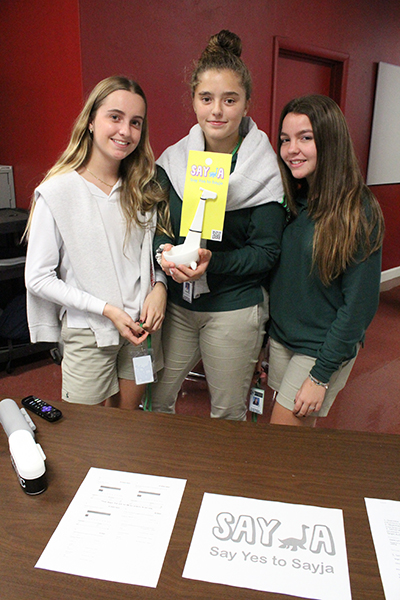
Photographer: CRISTINA CABRERA JARRO| FC
Immaculata-La Salle High sophomores Natalia Rosell, Romina Gutierrez-Zamora and Maite Ordorica, students in the marketing program, pose with their innovative ladle Sayja. The students teamed up with other classmates in the school's cross curricular project competition and won first place. In November, they presented their project to fellow students at the school's STEAM Day celebration exhibit.
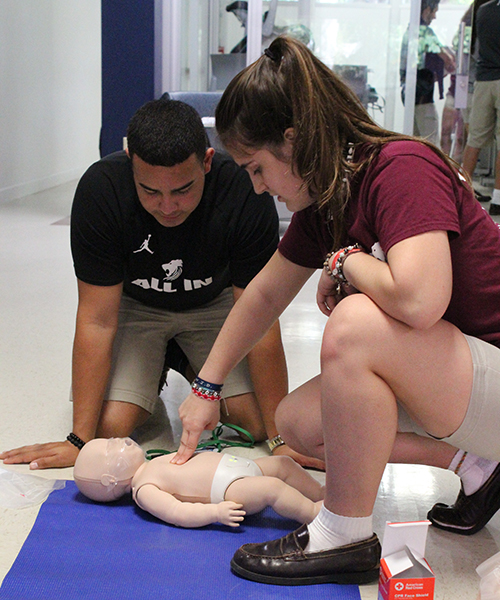
Photographer: CRISTINA CABRERA JARRO| FC
First aid even on the smallest: Immaculata-La Salle High students practice CPR compressions on an infant dummy at a makeshift first aid Health Science station at the STEAM Day celebration exhibit last November.
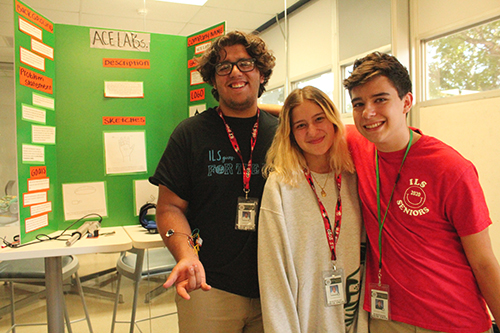
Photographer: CRISTINA CABRERA JARRO| FC
Immaculata-La Salle High ACE LABs creators Ernesto Walter, Annabella Iurman and Christopher Solanilla pose at their exhibit during the STEAM Day celebration. The trio created a muscle sensory device aimed at those suffering from brachial plexus injury, assisting them in raising and lowering their arm, as well as lifting weights.
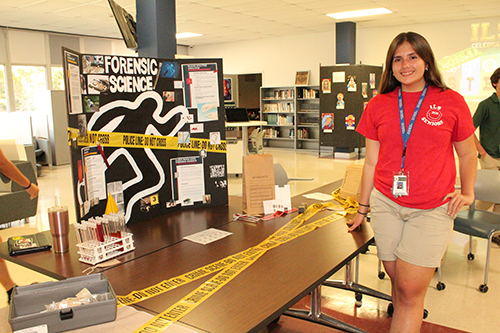
Photographer: CRISTINA CABRERA JARRO| FC
Who done it? Immaculata-La Salle senior Danielle Ladron de Guevara poses by the makeshift crime scene that students built for the STEAM Day celebration exhibit in November. Danielle wants to pursue medicine, but after taking a class in forensics, she is considering pursuing a career in the field.
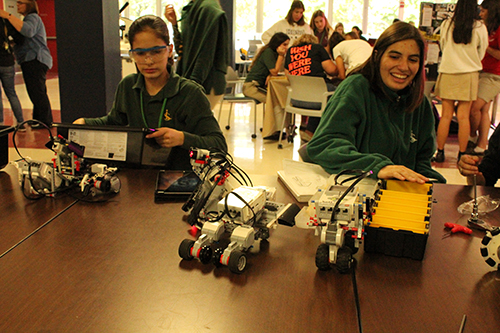
Photographer: CRISTINA CABRERA JARRO| FC
These aren't your ordinary Legos. They are robots, being steered by Immaculata-La Salle High students who shared their robotics skills at the STEAM Day celebration exhibit last November at their school.
“I’ve always believed that in order to learn something you have to get involved in it, hands-on,” said Rebecca Shaw, the STEAM program director and a science teacher at Immaculata-La Salle. “And that is at the center of all our programs, making sure that our students are getting involved, actively learning, and at the same time having fun while they’re doing it because they remember that.”
In 2013, Immaculata-La Salle became the first Catholic school in the country to be STEM certified by AdvancED. STEM provides students with industry-level skills in specific areas such as health science, engineering and computer science, global business, digital arts or legal Studies.
On National STEAM Day, “the idea is that students that sign up get to participate in focuses outside of their own, experiencing hands-on some of the activities and skills learned in each academy. The upper classmen led the exhibits, allowing for under classmen to explore and engage,” said Alishea Jurado, dean of Innovation at Immaculata-La Salle.
Among the sampler of activities that students could engage in: driving already-built Lego robots, observing live Adobe Photoshop art projects, creating global business marketing pitches for products created by students, and seeing a forensic lab exhibit with fingerprinting, dusting, and more.
Nicholas Blanco, a junior in the STEAM engineering focus, brought a Gameboy handheld video game console with the game DOOM installed. He built and designed it from scratch, and its circuit board is still bare because Nicholas is redesigning the outer shell of the console for a better fit.
“It’s really interesting to show the design process. You don’t always see your electronics in that stage where they are kind of an open circuit. This one is durable enough that you can show it without the case on it. It was a lot of circuit design and wire management, and that’s kind of what I’m learning to do with this project. It should be a cool product once it’s finished,” said Nicholas.
At Immaculata-La Salle, he has access to software that allows him to design, model and build, often with the assistance of a 3D printer — which printed the first shell of the game console. Nicholas is also assisting with the construction of a second 3D printer at the school. He dreams of pursuing a career in industrial design or industrial engineering.
HEALTH SCIENCE LESSONS
Several activities were available for students interested in health science, including a CPR station. With both child and adult CPR dummies laid out on floor mats, students could practice compressions and breaths guided by students or faculty in the field.
“I think it’s really important because it’s basic life support, and it’s important for everyday life, not just with CPR, but everything. I’ve gone out in public and seen people get hurt and I have been able to help them. I like making an impact on others, so I think that is a good way,” said Ana Marrero, a junior certified in CPR and first aid.
Another health science station featured interactive, life-like baby dolls that weighed almost eight pounds and actually cried and wetted. Larissa Pontes, a junior, said her experience with the baby care project, done with another teammate, filled her with respect for parents and caregivers.
“You wake up at 3 or 5 a.m. because the baby is crying. For school, it was rough carrying (it) because in addition to my school bag, I also had to take the baby, the car seat, and the diaper bag. I even took the baby to the mall because if not I would have spent the entire week at home,” Larissa said.
When she first applied to the science academy in pursuit of a future career in medicine, she felt passionate. After a few years and several classes, she said she realized that it’s no longer her calling, and instead wants to pursue a career in business.
“I have a lot of respect for the program and career. The program here at the school is beautifully made, and I learned so much. I now know what it entails and at least I got to experience it,” said Larissa.
EXPLORING OPTIONS
Larissa is not the first student to change her mind about a STEAM focus, and Shaw is OK with it.
“I tell them that it’s great that they’ve realized that and that they found another interest. They have the opportunity to explore and do that here. That’s what we want: the opportunities to explore options because they are young. They are trying to figure it out. So, the more opportunities they have to test different things around ‘the playground’ the better,” said Shaw.
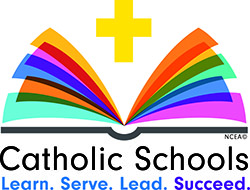
Catholic Schools Week is celebrated this year from Jan. 26 to Feb. 1.
At Immaculata-La Salle, what started off as a group of electives has become four-year programs for students, providing them a STEAM elective every year in addition to the required four years of math, science, an art elective, world languages, and all other classes. They also have opportunities to acquire industry level certifications, college credit, and a STEAM diploma.
It sounds like a lot, but Shaw said she believes it achieves a balance and a sense of well-roundedness. A Catholic education is also a significant factor.
“There is so much to be added to a person. There are so many components that go into us. When you include a Catholic education, you’re just building a bigger piece of that person. And what’s amazing is that we’re preparing students for jobs that don’t even exist yet. It’s giving them the skills set to be prepared for anything.”
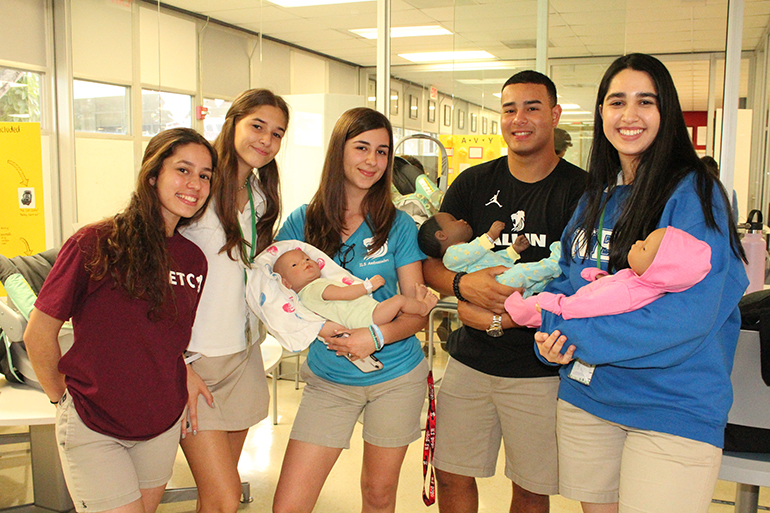
Photographer: CRISTINA CABRERA JARRO| FC
Oh babies: Immaculata-La Salle students Larissa Pontes, Camyle Pliopa, Maryrose George, Yaniel Rodriguez, and Gianella Martinez Gugliotta pose with some of the practice baby dolls given to students in the Health Science focus program.

